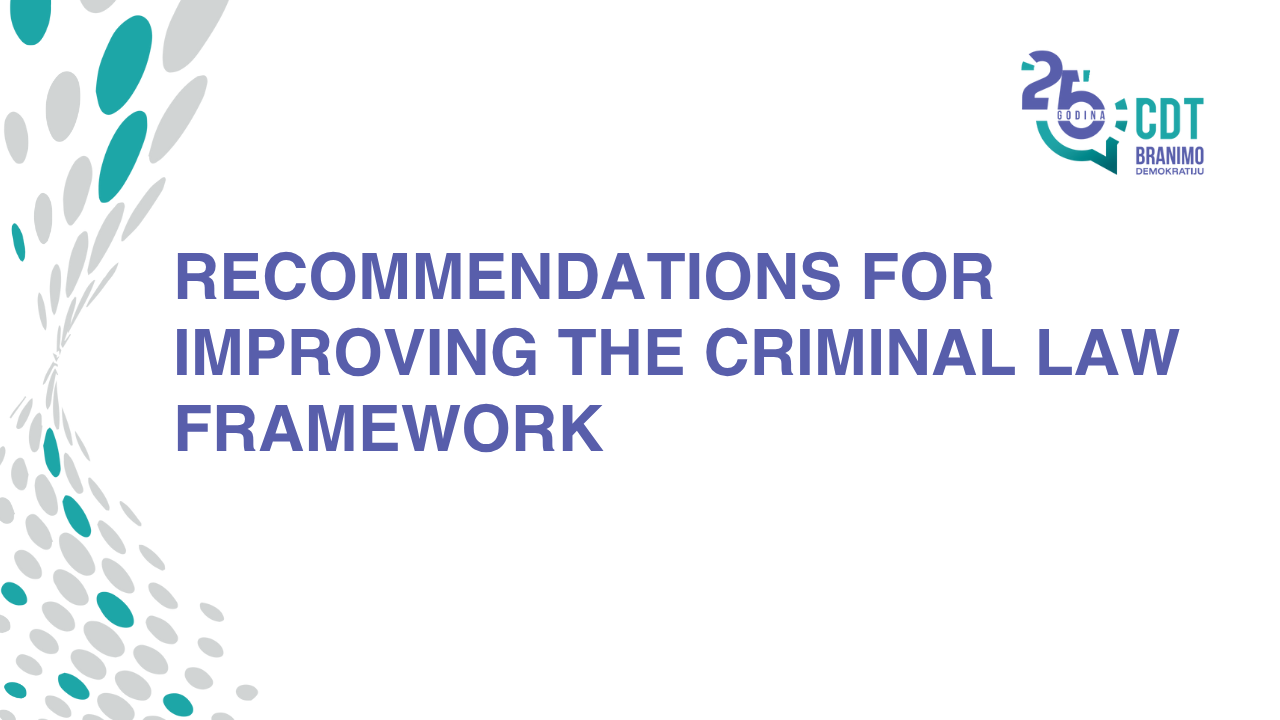The Center for Democratic Transition (CDT) submits to the Committee on Comprehensive Electoral Reform (the Committee) a set of recommendations aimed at improving the Criminal Code of Montenegro (CCM), to strengthen the protection of electoral rights and enhance the prevention of political corruption and abuses in the financing of political entities and election campaigns.
Criminal sanctions play a vital role in safeguarding electoral and political rights, which are foundational to the integrity of democratic societies. These rights underpin fair and representative governance by ensuring every individual’s voice is heard and their choices respected. By penalizing conduct that undermines these rights, such as coercion, obstruction of voting, intimidation, financial misconduct, and other forms of fraud, societies can deter such behavior and reinforce the democratic process. Criminal sanctions serve as a powerful deterrent, underscoring the seriousness of these violations and reaffirming that free and fair elections are inviolable. Without such protection, the very fabric of democracy is at risk, leading to diminished public trust in institutions and depriving the citizens of their right to vote, ultimately eroding the foundations of a just and equal society.
The proposals presented to the Committee reflect our long-standing commitment – spanning over two decades – to promoting fair and democratic electoral processes. They are directed at addressing and penalizing actions that have repeatedly undermined the integrity of elections in Montenegro.
In formulating these recommendations, we also considered the European Union’s recent “non-paper,” which rightly highlights the inadequacy of the current legal framework in sanctioning unlawful political financing: “It is noted that the legal framework is not aligned with GRECO and ODIHR recommendations to substantially increase transparency, control of the spending of political parties and prevent abuse of state resources, including dissuasive sanctions. As such, the existing legal framework still lacks robust safeguards and penalties for circumventing the rules.”
In other words, it is essential to establish a legal environment in which breaking the law is no longer a profitable strategy. This requires enhancing the quality of the Criminal Code by clarifying existing provisions and introducing new ones, thereby enabling competent authorities to respond effectively to legal violations.
Our proposal includes mechanisms designed to prevent various forms of misconduct that have severely compromised electoral processes in Montenegro.
While preparing these recommendations, we paid close attention to the rationale behind the proposed interventions and ensuring that the suggested penalties are proportionate. Excluding the most serious offences, the prevailing maximum sentence for electoral offences under the CCM is up to one year of imprisonment. This raises a valid question: can such a low maximum penalty achieve the intended purpose of punishment (Article 32 CCM), and within the broader objectives of criminal sanctions (Article 4, paragraph 2 CCM), can it serve to suppress conduct that undermines values protected by criminal law?
We believe that a shift in sentencing policy would mark a significant step forward – not only in improving the quality of our electoral processes but also in meeting the standards set by GRECO, the European Union, and the Venice Commission.
To that end, we are submitting to the Committee clearly articulated and well-reasoned proposals to establish several new criminal offences and to revise or strengthen several existing provisions of the CCM.
These include, in particular, the introduction of criminal offences for giving and receiving bribes related to voting, bribing members of parliament or local councilors, forging signatures for the purpose of certifying electoral lists, and concealing donations and benefits. We also propose amending the offence related to receiving contributions from prohibited sources.
We are confident that political actors who genuinely support meaningful and comprehensive reform of our electoral processes and are committed to meeting the criteria for Montenegro’s accession to the EU will unequivocally endorse these recommendations.
Those who truly want a fair electoral contest, a reduction in the undue advantages enjoyed by certain actors even before the race begins, and the continued development of our democracy, should have no doubts about the direction to take.
Our proposals are not aimed at any specific political party, whether in power or in opposition. They are directed at those who break the law – those who believe elections in Montenegro can still be won through unlawful, unethical, and corrupt practices. We believe the time has come to put a definitive stop to such actions.
We remain open to all well-intentioned comments and suggestions regarding our proposal and look forward to a substantive and constructive public discussion on this important topic.
The entire publication is available here.
The CDT Team



